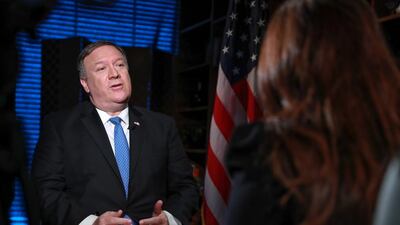On his first visit to the UAE on Monday, US Secretary of State Mike Pompeo sat down for an exclusive interview with The National's Editor-in-Chief. The conversation that ensued affords an exceptional insight into the US government's thinking and approach to the Middle East. Consider Iraq, where Iran has used militias under its command to increase its military footprint and political clout just as attempts are underway to forge a government there. Mr Pompeo was emphatic: "America wants an Iraqi Iraq for Iraqis" that is free from Iranian influence, he said. Mr Pompeo bluntly identified Iran, specifically Qassem Soleimani, the leader of the Quds wing of Iran's Revolutionary Guards Corps, as the chief obstacle to achieving progress in Iraq as well as Syria, and said it was time for partners to "to raise the cost for him – for his organisation and for him personally".
In a departure from the previous US administration's position, this Secretary of State appeared flexible about the future of Syrian president Bashar Al Assad, whose exit was once regarded in Washington as the prerequisite for a political settlement. Mr Pompeo subordinated the fate of Mr Al Assad to the more immediate need to reduce violence and resettle the millions of Syrians displaced by the civil war.
In Yemen, where a Saudi-led coalition has been leading a military campaign to restore the country's legitimate government, Mr Pompeo called for a political solution accompanied by a "global effort" to end meddling by Iran, which has armed the Houthi rebels and augmented their forces with its own personnel and fighters from Hezbollah, the Lebanon-based paramilitary group it controls. Mr Pompeo, paying tribute to the "great partners" in the UAE, Saudi Arabia and Bahrain, affirmed the US's willingness to "defend the region militarily" from Iranian aggression.
Where the Obama administration advanced the nuclear deal with Iran as a cure to Iranian belligerence, Mr Pompeo identified it as the reason for the worsening of Tehran's "malign activity". The resources generated by the deal have financed Iran's deadly operations in Yemen, Syria and Iraq – while doing nothing to contain its military build-up at home. But as sanctions re-imposed by US President Donald Trump go into effect, the "combined effort" of the US and its partners in the region, he said, can reverse Iran's gains and contain it.
Speaking as Nato members meet in Belgium, Mr Pompeo raised the possibility of a "comprehensive" new deal with Iran: one whose terms will extend to the nation's missile and space programmes, and be overseen by a "verification regime sufficient to ensure that nuclear weapons are not being hidden or developed in a clandestine way". Such a deal would be welcomed in this region, which continues to be threatened by Iran. Mr Pompeo's interview with The National should be a starting point of a broader discussion as Mr Trump holds talks with some of the signatories to the nuclear deal at the Nato summit.

